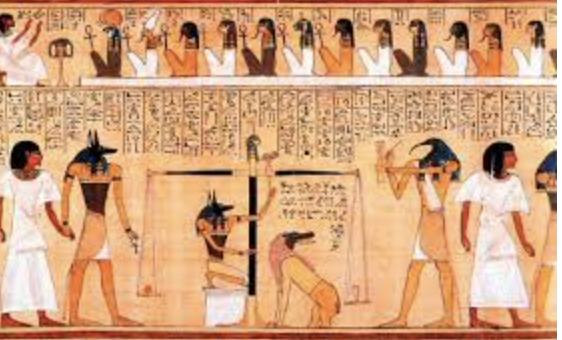“If my devils are to leave me, I am afraid my angels will take flight as well.” – Rainer Maria Rilke
This was the poet Rilke’s response to a proposal of psychoanalysis. At first glance, it appears to be a frightened and irrational claim. And yet it is based on an a concept of balance that is quite common.
The word balance comes from roots (bi) that means Two and (lanx) which means plate. The image is one of a scale, used to weigh substances of equal mass. Therefore, if you remove an amount from one side, you must remove the same amount from the other to retain a balance. In this instance, balance means equality.
There are other words to describe the concept of balance relating to our functions. “Poise” describes symmetry in the moving center. And we refer to harmony for the emotional center, health for the instinctive center, rationality for the intellectual center.

A magnetic center often is created by a sense of imbalance, particularly with the expectations of society. Essence senses a conflict with personality, both one’s own personality and that of others.
Essence and Personality
Through work, a student develops an observing ‘I’ that is isolated from these wrong or false manifestations. The observing ‘I’ can record what is happening without identification. With further work on oneself and through the second and third lines of work, a steward can come. The steward is gradually able to control one’s most obvious expressions of identification, lying and negative emotions. This stage of the work establishes a balance between the simplicity and humility of essence and the discipline of our true personality.
Such inner balance enables students to function together more harmoniously. Balance between the work of different centers is accelerated by observations of from others. A reasonable balance of centers, a strong steward, and a sensitive nine of hearts define the being of a man number four.

Trusting One’s “Ruling Faculty”
One might consider stopping there. If one continues, the stronger one’s commitment to the work becomes, the more demanding become one’s other obligations, to family, work, studies. If asked, one’s teacher may suggest forgoing meetings until one’s studies are complete, or interrupting one’s studies in order to participate more fully in the school. What becomes necessary is a balance of trust between one’s own ruling faculty–based on verifications through experience–and the perceptions of of one’s teacher, based on higher mind.
A further stage in the balancing act concerns the discarding of props and concepts. Like a tightrope walker who discards the balance pole, one must trust presence alone. In a state of presence, one can make a balanced decision, respond appropriately to any circumstance. Right action is not only a matter of appropriate use of function, but of appropriate aim.
Once one is “bound to a star” the purpose of any moment is to keep that direction, to be present. At this point, balancing the three lines of work–work on oneself, work with others, and work for the School–is critical. After much work, an attentive conscience arises, listening to the heart. Being vigilant to the thousand voices from elsewhere, one becomes able to trust the silent voice of presence.
A Focus on the Real
As one approaches a more permanent ‘I’, one’s sensitivity to energies penetrates more illusions. Unreal phenomena disappear. The idea of balance materializes. What Rilke came to realize is that one angel can expel thousands of devils.
A billion stars go spinning, high above your head,
but in you is the Presence that will be when all the stars are dead. – Rilke
The Egyptian Book of the Dead describes the ancient Egyptian “weighing of the heart”. If the heart proves true and the life good, feather and heart will balance equally, granting access to the afterlife.

Ruth Atkins is one of the editors of https://fourthwaytoday.org, and a former educator. For another recent article by this author, see https://fourthwaytoday.org/to-see-through-ones-eyes/.
